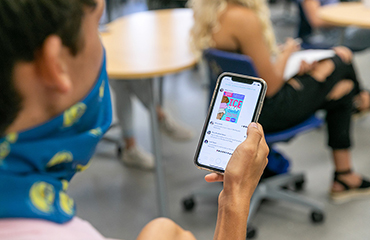
Lander University students began the new academic year fully prepared with backpacks, books, new schedules and syllabus outlines - along with face masks and rules for social distancing.
If the first few weeks are any indication, Lander students are ready for the COVID-19 era on campus, eager to be in class and prepared for the technology demands put in place to ensure their health and safety. While some students have chosen to take online classes, many others have chosen in-person instruction, which also has online features.
College freshman Braeden Sides, 18, of North Augusta, said he was eager to begin his collegiate experience. "I like the friendliness of the faculty and staff at Lander. When I visited and met the professors, I knew that I'd have their attention if I needed it."
The music education major plays the trumpet and hopes for a career as a high school band teacher. He attended an Honors College English class with roommate Anthony Scott, 18, his friend from Strom Thurmond High School. Scott said he was unfazed by the expanded use of technology in the classroom.
"Since the coronavirus, we've all had to use more technology. It's how we finished high school. If I have to have classes online, I'll be OK. I see it this way: Lander's doing a great job of keeping us safe."
Their professor Dr. Lillian Craton, Lander's Honors College director, discussed how some students will join the classes virtually. But having students in different locations hasn't marred Craton's enthusiasm for the semester. "Even when we are not all together, we will stay connected."
Craton instructed students to download the Pronto app, used for messaging, live video streaming and group video calls. There, students discovered an invitation for an outdoor ice cream social.
The usual scoops of ice cream would be replaced by pre-packaged frozen treats to ensure safety. "But I'll take a Popsicle any day. It's better than no ice cream. Right?" she asked.
In a Senior Seminar psychology class, taught by Dr. Amanda Cleveland, students learned how instruction via Blackboard would complement their classes. Cleveland, the recipient of Lander's Distinguished Professor Award, said class readings will be posted on Blackboard, where the students will develop questions for class discussion.
A major class project, which will help students prepare for the next phase of their professional development, will be the design of a plan about their goals and their preparations - whether it is a first job or the pursuit of a master's degree. Students will learn how to interview for jobs and graduate programs. "You probably will go to interviews online or in a mask," she said. "We'll do mock interviews to prepare you for the experience."
Beyond the classroom, technology is changing patient therapy in the field of psychology, she said.
An example is text therapy, which is considered the next generation of therapy in mental health.
"Some might say it can't be good and can't be effective," Cleveland said. "Yet, it may be a way to reach people in underserved populations."
Dr. Josie Ryan, who received Lander's Moore Award for Excellence in General Education Teaching, began her calculus class by telling students that the "most unusual part of the year is that office hours are only online."
She encouraged students needing assistance to send her a photo of their homework so that she could provide guidance and offered online meetings to discuss their studies. The class will feature both online and paper homework. "Because of the weirdness of this semester, we have to be responsible."
A student who joined the class online admitted some trepidation. "I've never done this before."
But her question about being online with her fellow students was quickly resolved, and the class began a rigorous discussion of vectors used in calculus. Throughout the discussion, Ryan showed that even a subject as demanding as calculus, can be taught in-person and online simultaneously with active discussion and participation by all students.
In Dr. Dori Dahlberg's pharmacology of nursing class, students are being prepared for online instruction, which requires the use of computers, webcams, microphones and high-speed internet.
"So much of nursing education is hands-on. But we learned to adapt to online instruction and testing in the spring. We've learned new ways to teach through online programs, and we will get through the semester with you," Dahlberg said.
Dahlberg emphasized the importance of preparation time for the class and its labs. "If you're not studying every day for something, you're probably not studying enough."
The rigors of the class, which will involve understanding medications, dosages and potential side effects, are not for the faint of heart. However, Lander nursing faculty are ready to assist, Dahlberg said. "When you need help, we want to help you. We are here for you."
Ellie Fulmer, 20, said she is planning a career in critical care nursing. Fulmer hopes to follow in the footsteps of her grandmother, who was a nurse. The junior from Spartanburg said she was glad to be back on Lander's campus after leaving in the spring. "I am not a fan of virtual learning. We did it and got through it. It worked. But I was ready for face-to-face teaching and seeing my friends."
For Dr. Pragya Sharma Ghimire's class on clinical exercise physiology, students will receive online postings about their class lectures, which will cover a wide range of topics, including hypertension, diabetes, obesity, chronic obstructive pulmonary disease and pharmacology. Sharing a bit of humor with the class, Ghimire told students that excuses such as "my dog ate my computer" will not be accepted.
Ghimire, the recipient of Lander's Young Faculty Scholarship Award, said the use of technology in her classroom will include sessions on conducting basic EKGs, which record electrical signals of the heart.
While teaching online and in-person may appear challenging, Ghimire said, "It's different. But we are going to weather this strong. There is a light at the end of the tunnel."